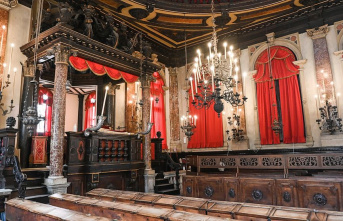CAIRO -- Libyan officials arrived in Cairo Sunday to resume talks about constitutional amendments that would allow for more elections. North African nation finds itself in a political impasse again, with two rival administrations seeking legitimacy.
Following clashes between rival militias in Libya, residents in Tripoli panicked and nightmares of past fighting in chaos-stricken Libyan were revived by the Cairo talks.
The U.N.-brokered talks between the Libyan parliament's east-based legislature and the High Council of State (an advisory body from west Libya) began amid international pressure for the two chambers of government to resolve their differences and agree on the legal basis of the election.
Stephanie Williams, U.N. special advisor on Libya, stated that talks will continue in Cairo until June 19, with the goal of establishing a constitution framework to allow the country to hold national elections as soon and as possible.
She told the audience at the opening session that the Libyan people were exhausted after eleven long years of divisions, dysfunction, conflict and chaos, as well as 11 long years of polarization. You have a chance, and a solemn obligation, to give them hope and to help them find a way to vote within a solid constitutional framework.
The parties reached an initial consensus over 137 articles in the constitution draft during the two previous rounds of negotiations. This includes rights and freedoms. Williams stated that they would continue to discuss a few disputed articles regarding legislative and judicial power.
The December failure of planned national elections was due to a dispute over the constitution.
International efforts to end a decade of chaos in Libya were severely hampered by the failure to hold the election. After a year of tentative steps towards unity, it has opened up a new chapter in Libya's long-running political impasse. Rival governments are now in power.
On Friday, Tripoli saw clashes between rival militias. Residents fled to shelter, while children and women fled a busy park. Artillery shells flitted across the night sky, prompting residents to seek refuge. The cause of the clashes was not known. Tripoli authorities said that an investigation had been opened.
Williams, U.N. advisor, condemned fighting and posted on Twitter, "Enough is enough!" she demanded that those responsible be held accountable.
Richard Norland, the U.S. ambassador in Libya, said that the United States would sanction those who were involved in the fighting and "will pay a penalty with the Libyan people"
This violence was the latest infighting between rogue militias in recent weeks, particularly in the western region. The western region is ruled over by an array militias that are loosely allied to the Tripoli-based government headed by Prime Minister Abdul Hamid Dbeibah.
The forces of Khalifahifter, a military commander, are in control of both east and south Libya. He is also allied to a rival government headed by Fathi Bashagha (a parliament-appointed Prime Minister).
Since Moammar Gadhafi, the long-serving dictator of oil-rich Libya, was overthrown by a NATO-backed uprising in 2011, conflict has decimated the country. For years, the country was divided between rival administrations from the east and west. Each one supported by different militias.












